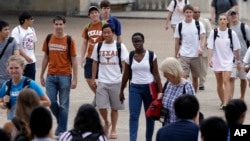From 1990 to 2000, the Center for Immigration Studies reported, the number of immigrants living in the United States increased 43 percent, to 28.4 million — the largest immigration boom of the 20th century.
Among the contributing factors were the Immigration Reform and Control Act of 1986, which legalized undocumented immigrants who had entered the U.S. before 1982, and a boom in immigrant fertility. Today, many of those children born to immigrant parents are eligible to vote.
The numbers have given rise to a new electorate. Four states and the District of Columbia currently have nonwhite majorities. The U.S. Census Bureau projects that in 2044, the U.S. as a whole will follow suit and officially become a “majority-minority” nation.
Already in New Mexico and California, Latinos constitute the largest racial/ethnic group. Texas, which already has a nonwhite majority, might be next. The Pew Research Center reported a 63.5 percent increase in the state’s Hispanics from 2000 to 2012, a growth rate that exceeds that of the non-Hispanic white population.
The implications for both the 2016 presidential election and many years to come are evident: Comprehensive immigration reform is an important issue for many Americans.
Vincent Boudreau, dean of the Colin Powell School for Civic and Global Leadership at the City College of New York and an expert on the politics of social movements, said Republican presidential candidate Donald Trump has moved the topic front and center.
“In 2013, when American voters in New Hampshire and Iowa were asked about what issues were the most important to them, immigration didn’t make it on their top five, and now it’s in the top three issues in those states, largely because Donald Trump insisted on putting it there,” Boudreau said.
Candidates cautious
He said Trump’s decision to “play the security card” during his presidential bid announcement in June — in which he referred to some Mexican immigrants as criminals and rapists — has again become an important topic following the Paris attacks. As a result, Boudreau said, candidates — including Democrats — are beginning to be more careful about how they address the relationship between immigration and refugee policies.
Steve McFarland, coordinator at Long Island Civic Engagement Center in New York, works to increase electoral participation by disenfranchised communities. He said grassroots organizations like his are turning energy from anti-immigration rhetoric into electoral participation.
“Some of our community members may have stayed out of national politics, and many are politically conservative or moderate, but the tone of this debate has really galvanized a lot of Latinos,” McFarland wrote in an email to VOA.
He said the same was true for the #BlackLivesMatter movement, a community he described as “desperate to make their voices heard” in addressing police violence and issues of social justice.
Boudreau said African-Americans and the African diaspora at large are united on many community issues, including policing and opportunity. He said that unlike the case in past elections — in which African-Americans have lopsidedly voted for Democrats — no candidate should take their votes for granted.
“There’s a mobilized social movement around these issues," he said, and its members will tell candidates, " 'If you don’t embrace these issues, you can’t count on our support.' That’s a new thing in American politics.”




